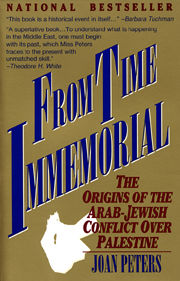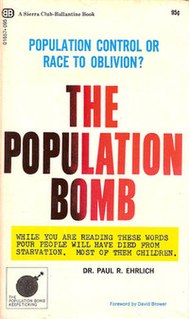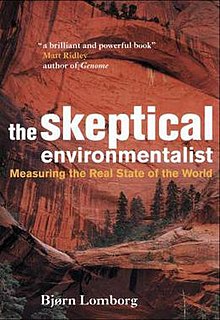 W
WThe book An Essay on the Principle of Population was first published anonymously in 1798, but the author was soon identified as Thomas Robert Malthus. The book warned of future difficulties, on an interpretation of the population increasing in geometric progression while food production increased in an arithmetic progression, which would leave a difference resulting in the want of food and famine, unless birth rates decreased.
 W
WThe Fertility Transition in Iran: Revolution and Reproduction is a 2009 book by Meimanat Hosseini-Chavoshi, Peter McDonald and Mohammad Jalal Abbasi-Shavazi in which the authors examine the fertility rate changes in the Islamic Republic of Iran. The book was awarded Iran's Book of the Year Award.
 W
WFrom Time Immemorial: The Origins of the Arab–Jewish Conflict over Palestine is a 1984 book by Joan Peters, published by Harper & Row, about the demographics of the Arab population of Palestine and of the Jewish population of the Arab world before and after the formation of the State of Israel.
 W
WThe Limits to Growth (LTG) is a 1972 report on the exponential economic and population growth with a finite supply of resources, studied by computer simulation. Commissioned by the Club of Rome, the findings of the study were first presented at international gatherings in Moscow and Rio de Janeiro in the summer of 1971. The report's authors are Donella H. Meadows, Dennis L. Meadows, Jørgen Randers, and William W. Behrens III, representing a team of 17 researchers.
 W
WThe Population Bomb is a best-selling book written by Stanford University Professor Paul R. Ehrlich and his wife, Anne Ehrlich, in 1968. It predicted worldwide famine in the 1970s and 1980s due to overpopulation, as well as other major societal upheavals, and advocated immediate action to limit population growth. Fears of a "population explosion" existed in the 1950s and 1960s, but the book and its author brought the idea to an even wider audience.
 W
WPopulation Control: Real Costs, Illusory Benefits is a nonfiction book by Steven W. Mosher, first published in 2008. Population Control is a detailed exposition on the global effort to combat overpopulation, arguing that not only population control is immoral in many cases, but that overpopulation is a myth.
 W
WThe Skeptical Environmentalist: Measuring the Real State of the World is a book by Danish environmentalist author Bjørn Lomborg, controversial for its claims that overpopulation, declining energy resources, deforestation, species loss, water shortages, certain aspects of global warming, and an assortment of other global environmental issues are unsupported by statistical analysis of the relevant data. It was first published in Danish in 1998, while the English edition was published as a work in environmental economics by Cambridge University Press in 2001.
 W
WThe Ultimate Resource is a 1981 book written by Julian Lincoln Simon challenging the notion that humanity was running out of natural resources. It was revised in 1996 as The Ultimate Resource 2.